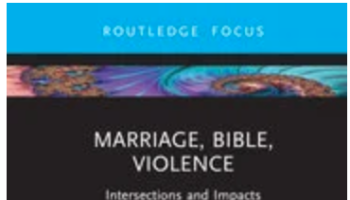Today’s blog post is by Prof Juliana Claassens, Professor of Old Testament and Head of the Gender Unit in the Faculty of Theology at Stellenbosch University, South Africa. After reading her new book, Writing and Reading to Survive (Sheffield Phoenix Press, 2020), the Shiloh editors invited her to write a piece about it for the website. Professor Claassens can be contacted at jclaassens@sun.ac.za.
At the recent book launch for my new book Writing and Reading to Survive: Biblical and Contemporary Trauma Narratives in Conversation (Sheffield Phoenix Press, 2020), the discussion leader, my colleague and good friend, Prof Alphonso Groenewald (University of Pretoria, South Africa), asked me about the genesis of this book and the fact that I already in 2008 was involved with the early buddings of what would become the field of trauma hermeneutics. I told him that this was such a good question as it helped me to reflect on the way this current book built on and morphed out of my previous work. For instance, my interest in lament and resistance came out of my work on a chapter that I wrote for my 2004 monograph The God who Provides (Abingdon) when I looked at the question of when God does not feed, which led to my work on God as a Wailing Woman in my 2012 monograph Mourner, Mother, Midwife (Westminster John Knox). Lament and resistance also featured in my 2016 monograph on Female Resistance in the Old Testament (Claiming Her Dignity, Liturgical Press) as I considered a number of trauma narratives in which women resist the violence of war and rape that all but destroyed body and soul, but also what I later would describe as the insidious trauma of patriarchy, and the slow violence of poverty.
It is, moreover, interesting how the original idea for this book on biblical and contemporary trauma narratives was sparked in an essay I wrote for a consultation between Stellenbosch University and PTHU in the Netherlands in which I brought the portrayal of sexual violence effected against Daughter Zion into conversation with the rape of Lucy Lurie in the South African novel, Disgrace, by the Nobel laureate JM Coetzee (Fragile Dignity, Semeia, 2013). For Writing and Reading to Survive, I revisited and completed reworked the original essay, which in itself was an interesting case study of how one’s thinking and writing mature over the span of a decade.
And yet, looking back, there is a clear sense of continuity that runs through my work. It can be summarised in the following declarations that go to the heart of my scholarship which informs my teaching and vice versa:
- I believe in the importance of naming injustice both in the ancient Scriptures but also in contemporary contexts near and far – as the oft-cited slogan would have it, “breaking the silence on gender-based violence.”
- I am interested in the role of narratives as an integral part of the meaning-making enterprise as victims and witnesses of trauma, long ago and more recently, engage in text production, thus in terms of the title of my book, “writing to survive.”
- I have realized, from a very early age on, the liberating potential of books and films and art as we enter the story worlds of others, joining in their struggles, making sense of our own – hence, in an act of text reception, “reading to survive.”
Writing and Reading to Survive is deeply existential – for as we feminist interpreters know all too well, the personal is, and more often than not, becomes political. But given the fact that biblical and contemporary trauma narratives took on a life of their own, transcending the original contexts of pain and suffering that saw their origin, it also has become clear that the content and the approach of this book extends far beyond the context in which it was first written. As South African commentator Max du Preez has said about my fellow South Africans, but one could also make a similar argument about other members of our global village: There is a multitude of “multiple wounded, multiple traumatized” individuals and communities around us. Not only is it the “shocking occurrences,” of extreme trauma that as Kai Erickson has argued, result in “inner catastrophes” that impact individuals but also fester below the surface of a society’s collective consciousness, but also what Laura Brown has described as the many “secret,” “private” and “hidden” experiences of trauma that affect especially women near and far.
In Writing and Reading to Survive, I argue that the growing popularity of trauma hermeneutics for interpreting biblical texts may be rooted in its ability to open up new vistas, to offer novel answers to old questions, and to reframe experiences and texts in such a way that it rings true to a new generation of readers. By bringing biblical and contemporary trauma narratives into conversation, I argue that writers and readers in a world away, as also today, in an attempt to survive, are trying in the form of literature to make sense of the trauma that upended their world in significant ways. In this regard, one could say that the trauma narratives included in this volume, the biblical stories of Rachel and Leah and their handmaids Bilhah and Zilpah, the Daughters of Lot, Ruth and Naomi, Dinah, and Woman Zion in the Book of Lamentations, but also a number of contemporary novels including The Handmaid’s Tale (Margaret Atwood), Disgrace (JM Coetzee), The Bookshop (Penelope Fitzgerald), The Light Between Oceans (ML Stedman), and Milkman (Anna Burns), serve as a type of community, a host of witnesses which collectively offers a space in which the traumatized individuals from different times and places may experience themselves as a little less alone. Indeed, in the safe space created by literature, trauma may be endured, comprehended, and ultimately mitigated.

Works Cited
Laura Brown, “Not Outside the Range: One Feminist Perspective on Psychic Trauma,” in Trauma: Explorations in Memory (ed. Cathy Caruth; Baltimore, MD: John Hopkins University Press, 1995), pp. 100-112.
Max du Preez, “Who is to Blame for South Africa’s Failures,” in News24.com, viewed 1 February 2017, from http://www.news24.com/Columnists/MaxduPreez/who-is-to-blame-for-south-africas-failures-20160614.
Kai Erickson, “Notes on Trauma and Community,” in Trauma: Explorations in Memory (ed. Cathy Caruth; Baltimore, MD: John Hopkins University Press, 1995), pp. 183-199.







Thank you so much for sharing this blog with us. The forms of writing, reading and story-telling that draws one in fully is a medicine or elixir. We share so much in common whether one looks at this across thousands of years back to a time when we evolved from the first species in East Africa, or presently as beneficiaries of different sovereigns. In lamenting we express our needs or for the sake of political distillation, our interests. This is where the tempests rage or where the calm is witnessed. Thanks Shiloh team.